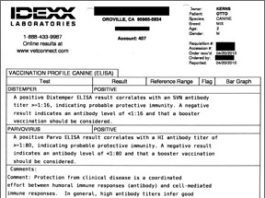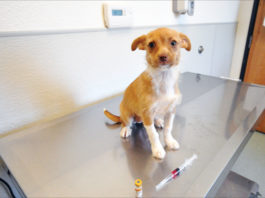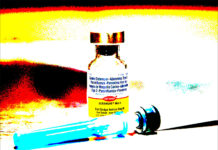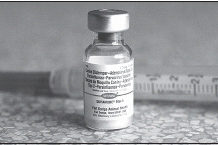Reduced Vaccination Schedule
An annual booster using distemper, hepatitis, parainfluenza, killed or modified-live virus parvovirus is given at one year of age. Thereafter, boosters are given every three years until old age. Beyond 10 years of age, booster vaccinations are generally not needed, and may be unwise if aging or other diseases are present. For animals at high exposure risk to parvovirus disease, an additional parvovirus vaccination can be given at the six-month point, if killed parvovirus is used. This extra booster is typically not needed if MLV parvovirus is used.
Dog Vaccination Information
Vaccines are something that every dog owner should be educated about, and yet few seem to think about them at all, except to wonder about the need for them after they get a new dog. However, many people base this concern on the vet bill, rather than worries about the potential for side effects in their dogs! Immunology expert Ronald Schultz, PhD, Diplomate ACVIM (American College of Veterinary Internal Medicine), has spent much of his career studying animal vaccines. Dr. Schultz is professor and chair of the Department of Pathobiological Sciences at the University of Wisconsin-Madison School of Veterinary Medicine, and has more than 40 years' experience in the field of immunology. His long-time university employment - as opposed to a career in industry - has provided him with a unique position of neutrality from which to observe the vaccine industry.
Bad News for Dog Owners Looking for Single-Antigen Vaccines
I have always run titers on my dogs before vaccinating and my vet provided individual doses when required. This year was different. The office manager called and said their practice could no longer provide individual vaccines, as in the past. I vaccinate only for parvo, distemper when titers are low, and rabies. I was quite upset because one of my dogs needed only distemper and my other dog’s titers were good. I posed the question, “Why offer titers, if you are not able to provide individual vaccines? Big silence! Well, I know the answer.
Puppy Shots – Understand Vaccinations
Modern-day dog owners enjoy the comforting certainty that their puppies can and will be given a series of vaccinations, so-called “puppy shots,” to protect them from life-threatening canine diseases such as distemper, parvovirus, and rabies. Most of us were indoctrinated in early childhood to schlep Shep to the vet once a year for his annual booster shots in order to extend that vital protection year after year. We accepted without question that a failure to do so was the height of dog owner irresponsibility.
Take the Titer Test before Administering Vaccinations
Now more than ever, vaccine titer tests are readily available, not terribly expensive, and offer multiple advantages over the practices (intentional or not) of over-vaccination and under-vaccination. Few issues in veterinary medicine are as controversial as the debate about administering annual vaccinations to our dogs. Long considered part of the standard of baseline, responsible veterinary healthcare, and credited with conquering some of the fiercest canine viral and other infectious diseases, vaccinations now are also suspected of creating vulnerability to illnesses and chronic conditions such as anemia, arthritis, seizures, allergies, gastrointestinal and thyroid disorders, and cancer.
Defining Over-Vaccination
Let’s be clear: In most cases, vaccines are miraculous, life-saving agents. The diseases they (usually) prevent in our dogs range from always fatal (such as rabies) to serious and sometimes fatal (such as distemper, parvovirus, leptospirosis) to the rarely fatal (such as bordetella and coronavirus). And even diseases that are not fatal can cause all sorts of grief for both the dog in question and his owner (and the owner’s pocketbook). Dog lovers the world over are eternally grateful for the gifts that modern vaccines have conferred upon our canine companions.
Vaccination and Canine Distemper Virus (CDV)
When we decided not to vaccinate Caleb, our Bouvier des Flandres, against anything other than rabies, my friend Janice and I knew we ran a risk that he might develop a dreaded disease. We also knew that vaccination doesn't always protect against disease, and believed it sometimes causes illness. We felt the home-prepared BARF (bones and raw foods) diet we fed him would help his body fight off many health problems. Naturally, we hoped that Caleb would never come down with anything serious like canine distemper virus (CDV). But, when he was three years old, we had to face and overcome exactly that challenge.
Understanding Canine Vaccinations
Most dog owners are responsible and understand the importance of protecting their companions from preventable disease. That’s surely what motivated the dozens of people I observed standing in a long line with their dogs and puppies at a low-cost vaccination clinic offered in a local pet supply store.
Time to Vaccinate the Dog?
I am surprised at how frequently the subject of vaccinations comes up with my dog-loving friends. We often talk about the pros and cons of certain vaccines and look for the latest information. We struggle to understand the complexities, and to sort out the facts from the controversy. When it comes to vaccines, being an advocate for our dogs may be the most important thing we can do. Being an advocate doesn't mean being an expert, but it does mean taking action. These tips can help you take action that supports your dog's good health.
Shots Fired: Professional veterinary associations call for a reduced canine vaccination protocol
In the past decade, the veterinary profession’s overall attitude toward vaccination has evolved to a point that can be tentatively termed progressive. In 2002, the American Veterinary Medical Association issued a policy statement that urged veterinarians to “customize” vaccine protocols for individual patients, since there is “inadequate data to scientifically determine a single best protocol” for initial or repeat vaccinations. A year later, the prestigious American Animal Hospital Association (AAHA) released its landmark canine vaccination guidelines, which were updated in 2006.
The Deal with Puppy Shots
You might be surprised to know that dogs don't actually need a series" of shots in order to be immunized against canine diseases. That said
Holistic Veterinarians Take on The Annual Vaccination Schedule
Holistic veterinarians have long decried the annual vaccination schedule recommended by many conventionally trained veterinarians for all dogs. Many holistic veterinarians suspect that many of the complex ailments that plague our modern dogs – from allergies to digestive problems to aggressive behavior and so on – have their roots in immune system problems brought on by excessive and unnecessary vaccination. However, many of us are convinced by our veterinarians that our dogs won’t be safe unless they receive these boosters every year. Fortunately, a recent study indicates that most dogs retain humoral antibody protection from past vaccinations for longer than previously thought.
















